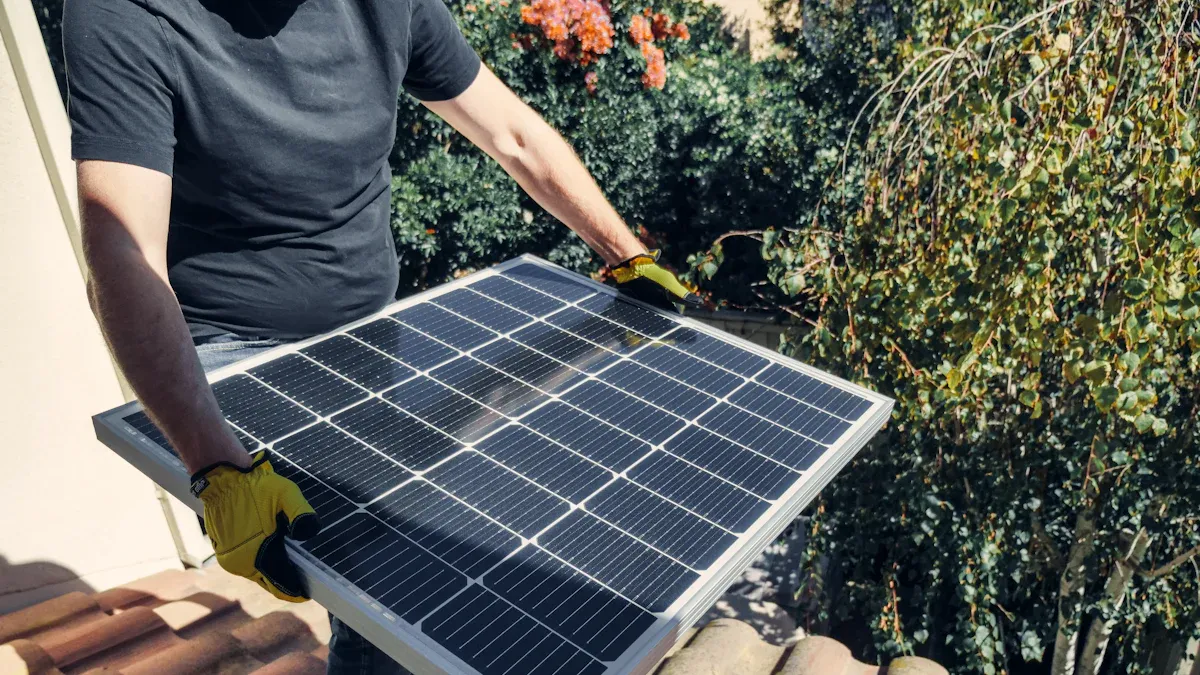What is a Home Energy Storage System?
Purpose and functionality
A home energy storage system helps manage and use energy wisely. It saves extra energy from solar panels during the day. This stored energy is used at night or during power outages. It keeps your home powered when the grid or solar panels can't.
The main goal is to make you less dependent on the grid. Using less grid power lowers your electricity bills and avoids high charges. These systems also help the environment by using more renewable energy like solar power.
Batteries are the key part of this system. They store energy as chemicals and release it as electricity when needed. Smart systems control energy flow to avoid waste and ensure efficient use. Inverters change stored DC energy into AC energy to run your home appliances.
Experts say these systems work better than older methods. They manage power well and fit renewable energy into homes easily. Lithium-ion batteries are especially good at handling uneven energy production. They are reliable and perform well.
How it works with a solar panel system
When used with solar panels, energy storage systems work even better. Solar panels turn sunlight into electricity. During the day, extra electricity is saved in the storage system. This stops energy from being wasted.
At night or on cloudy days, the stored energy powers your home. This ensures you have electricity no matter the weather or time.
Combining solar panels with storage systems has many benefits. It reduces grid use, cuts electricity costs, and provides backup power during outages. Studies show this setup is very efficient. For example:
Using solar panels with energy storage saves money and energy. It also helps the planet by cutting carbon emissions.
Types of Home Energy Storage Systems
AC-coupled systems
AC-coupled systems save energy after it changes into alternating current (AC). These systems are great for homes with existing solar panels. They don’t need big changes to your current setup. The solar panel inverter changes direct current (DC) into AC, which the battery stores.
One big benefit of AC-coupled systems is their adaptability. You can add them even if you already have solar panels. They also let you connect more batteries to store extra energy. But, energy is lost during conversion, which lowers efficiency a bit.
DC-coupled systems
DC-coupled systems save energy in its original form, as direct current (DC). These systems are very efficient because they skip the double conversion process. Energy from solar panels goes straight into the battery without changing to AC first.
DC-coupled systems are affordable and dependable. They use fewer parts, which makes installation and maintenance cheaper. With fewer components, there’s less chance of something breaking, making them reliable.
DC-coupled systems lose less energy since they convert only once.
These systems cost less because they need fewer parts to work.
Fewer parts mean fewer problems, so they are more trustworthy.
Key differences and choosing the right system
Picking between AC-coupled and DC-coupled systems depends on your needs. AC-coupled systems are best if you already have solar panels. They let you add storage without big changes. DC-coupled systems are better for new solar setups and offer higher efficiency.
Here’s a simple comparison:
When choosing, think about efficiency, cost, and your solar setup. If you want flexibility, go with AC-coupled systems. If you care more about efficiency and reliability, pick DC-coupled systems.
Key Components of a Home Energy Storage System
Batteries
Batteries are the most important part of energy storage. They save energy from solar panels during the day. This energy is used when needed, like at night. Modern batteries, such as lithium-ion, are very efficient and reliable. They can last through thousands of charges, making them long-lasting.
Good battery systems can work for up to 15 years. For instance:
Batteries for frequency control can last 24 years.
Batteries for self-use may last about 13 years.
Peak shaving batteries usually last around 15 years.
Battery performance depends on certain measures. These include round-trip efficiency (RTE), Coulomb efficiency (CE), and depth of discharge (DoD). Here's a simple table:
Inverters
Inverters are key to making stored energy usable. Batteries keep energy as direct current (DC). But home devices need alternating current (AC). Inverters change DC into AC so your devices can use it.
Modern inverters are better at saving energy during this process. They also connect solar panels, batteries, and your home system smoothly. By managing energy flow, inverters help you use your system efficiently.
Energy Management Systems
Energy management systems (EMS) are like the brain of your setup. They control how energy moves between solar panels, batteries, and your home. EMS makes sure energy is used wisely, saving money and reducing waste.
These systems improve power use, sustainability, and sharing. For example:
With EMS, your solar battery system works better. It also keeps your home powered during blackouts.
Integrating a Home Energy Storage System with Solar Panels

Compatibility with solar panel systems
When adding a home energy storage system to solar panels, they must work well together. This ensures energy is stored and used efficiently. Safety and performance tests, like UL 9540 and UL 9540A, confirm the system meets important standards.
These certifications prove the system is safe and works properly. They also check that parts like inverters and batteries match your solar setup.
If you already have solar panels, check if they support batteries. Many newer systems are made to work with batteries easily. Older systems might need upgrades to connect properly.
Installation process
Adding battery storage to solar panels involves several steps. First, figure out how much energy your home needs. This helps decide the battery size and type. Next, a professional checks if your solar system can handle the new parts.
The main steps include:
Connecting the batteries: Batteries store extra energy from your solar panels.
Setting up the inverter: Inverters change stored DC energy into AC for your home.
Configuring the energy management system: This system controls energy flow for better use.
Different batteries take different times to install and work differently. For example:
Li-ion batteries are the most popular for homes. They are efficient and simple to install.
Hiring a professional ensures the system is set up safely. It also protects your solar panels and batteries from damage during installation.
Optimizing solar battery storage performance
To make the most of your solar battery, focus on improving its performance. This saves energy, cuts costs, and helps batteries last longer.
One way is to track when your home uses the most electricity. Adjust your system to store and release energy at the best times.
Another tip is to take care of your batteries. For example, using only a small part of the battery's energy can make it last longer. A study showed that a battery with 10% discharge lasted 2,500 cycles or about 9.5 years.
Advanced energy management systems can also help. These systems use smart tools to balance energy between solar panels, batteries, and appliances.
Self-scheduling strategies are steady and work well for homes. Spread-price strategies save more energy but can be less predictable.
Improving your solar battery system makes it more efficient and reduces grid use. It also gives you backup power during outages and lowers your electricity bills.
Benefits and Considerations of Home Energy Systems
Cost savings and efficiency
Home energy systems help you spend less on electricity. They let you use stored energy when power rates are high. This lowers your bills and makes your solar system more valuable.
These systems also stop energy from being wasted. Batteries save extra solar power during the day. Later, they release it when your home needs it. This way, you use all the energy your panels make.
They also protect you from rising energy prices. Buying solar batteries now can save you money later. Over time, the savings can be more than the upfront cost. This makes it a smart choice.
Environmental impact
Using home energy systems helps the planet. Solar power is clean and doesn’t pollute like fossil fuels. By storing and using solar energy, you help reduce harmful emissions.
These systems also make solar energy more useful. They give you power even when the sun isn’t shining. This encourages more people to switch to solar, which helps the environment.
They also promote responsible energy use. By saving and using energy wisely, you waste less and conserve resources. Every bit of saved energy helps create a greener world.
Tip: Switching to solar battery storage helps fight climate change and protects the environment.
Upfront costs and long-term value
Home energy systems can cost a lot at first. Batteries, inverters, and installation add up quickly. This can make it hard for some people to afford. But the long-term benefits often make up for the high cost.
These systems make your home more appealing to buyers. Many people now look for homes with solar and energy storage. They also increase your home’s value, making them a good investment.
They prepare you for future energy needs. As electricity prices go up, stored solar energy becomes more valuable. Over time, the savings and added home value make the cost worth it.
Here’s a simple summary of the pros and cons:
By thinking about these points, you can decide if a home energy system is right for you. While the starting cost is high, the savings and environmental benefits make it a smart choice for many.
Home energy storage systems help you get the most from solar power. They have many benefits that make them a great option for homeowners:
Energy Independence: Save extra solar energy to use later. This keeps your home powered during blackouts and supports off-grid living.
Cost Savings: Use stored energy when electricity is expensive. This lowers your bills and increases the value of your solar panels.
Environmental Impact: Use more renewable energy to cut down on fossil fuels and reduce pollution.
Looking at system types, costs, and compatibility helps you choose wisely. By using these systems, you help the planet and take control of your energy use.
FAQ
How long do home energy storage batteries last?
Most batteries work for 10 to 15 years. Lithium-ion batteries are strong and can handle many charges. Taking care of them helps them last longer.
Tip: Don’t let batteries drain completely to keep them working well.
Can I add a battery to my current solar panels?
Yes, you can add one. AC-coupled systems are great for existing setups. They are simple to install and need only small changes.
Note: Make sure your solar panels can work with a battery first.

